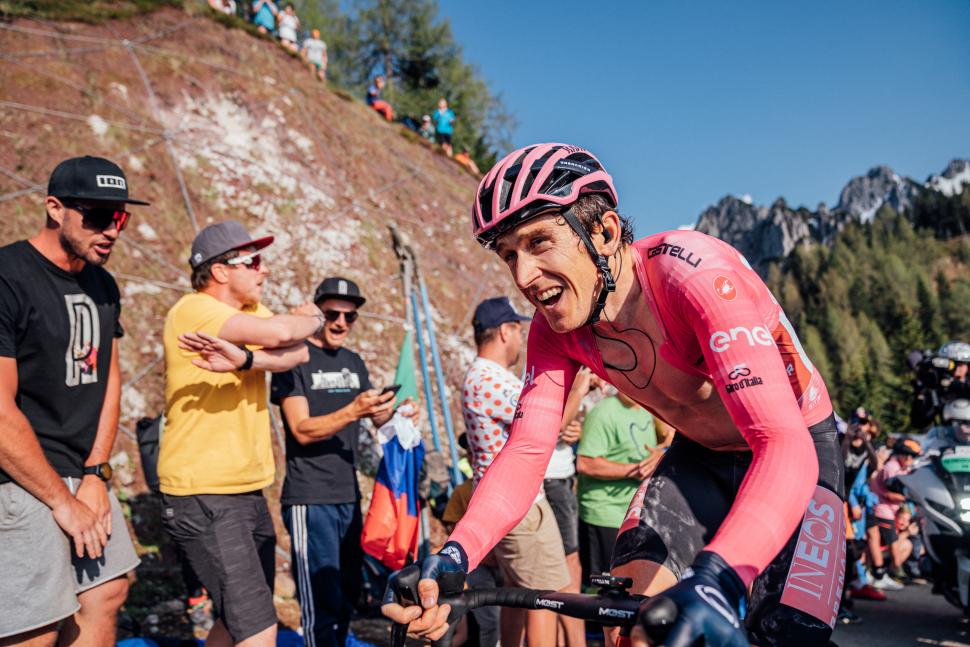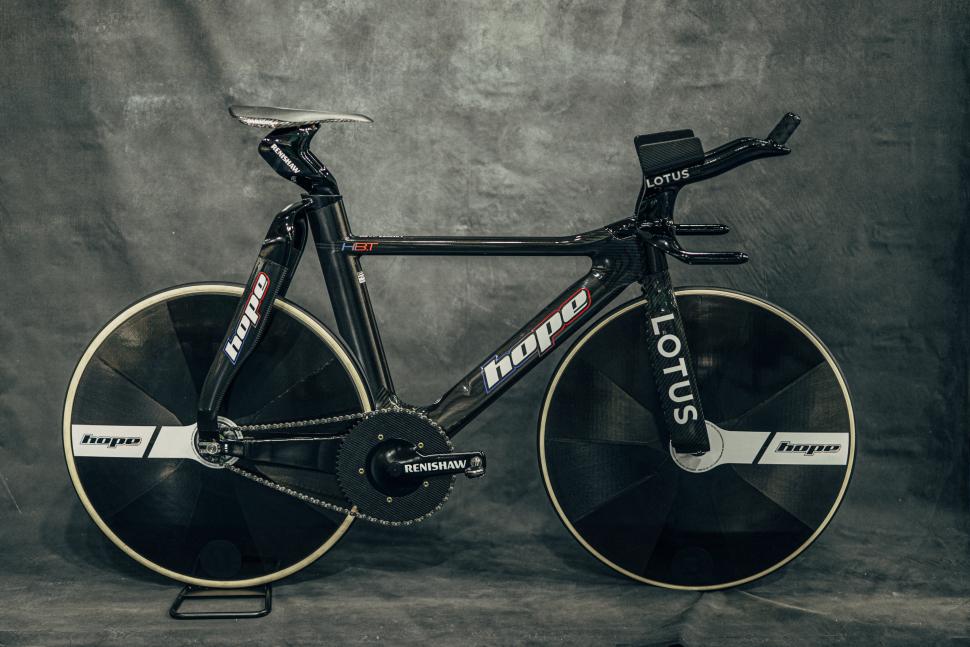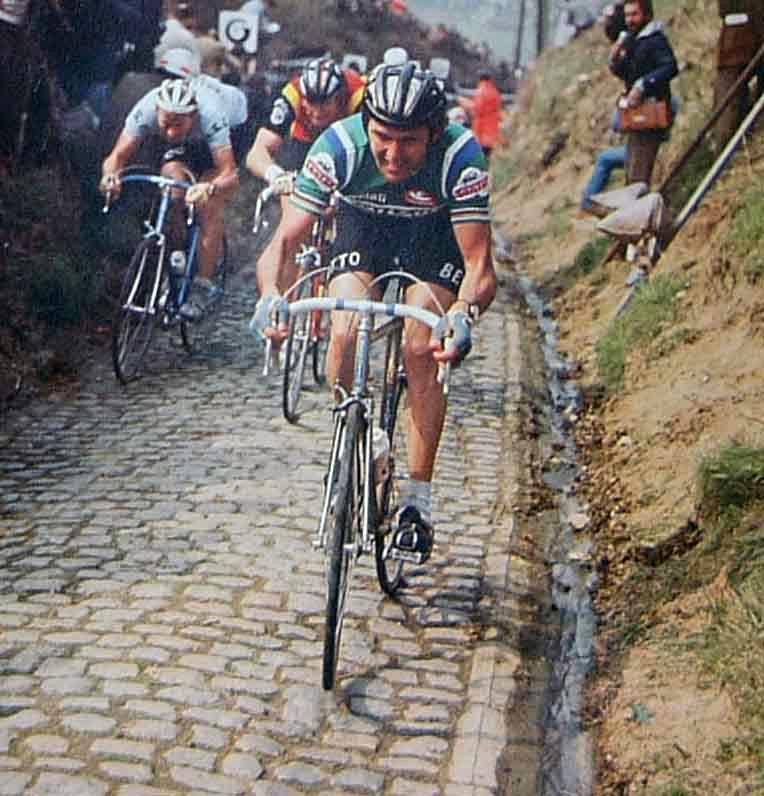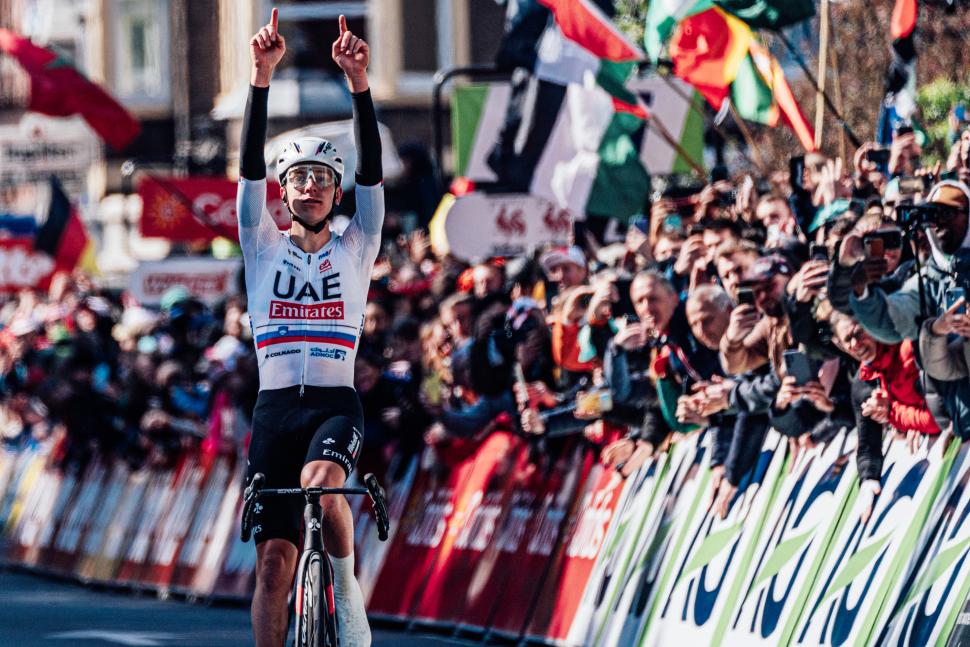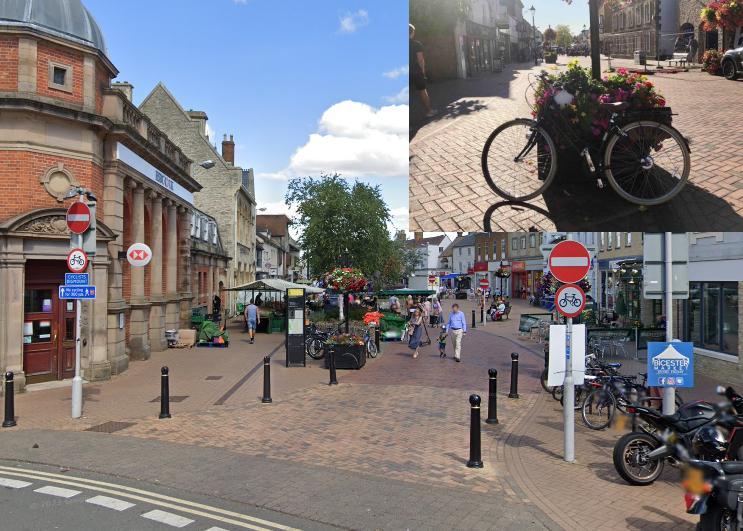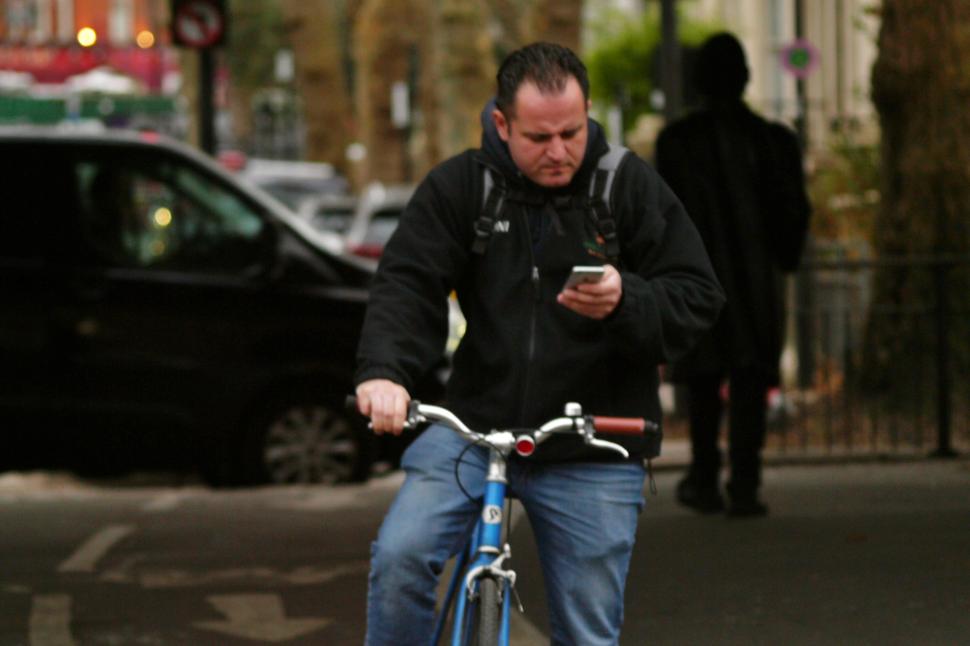- News
- Reviews
- Bikes
- Accessories
- Accessories - misc
- Computer mounts
- Bags
- Bar ends
- Bike bags & cases
- Bottle cages
- Bottles
- Cameras
- Car racks
- Child seats
- Computers
- Glasses
- GPS units
- Helmets
- Lights - front
- Lights - rear
- Lights - sets
- Locks
- Mirrors
- Mudguards
- Racks
- Pumps & CO2 inflators
- Puncture kits
- Reflectives
- Smart watches
- Stands and racks
- Trailers
- Clothing
- Components
- Bar tape & grips
- Bottom brackets
- Brake & gear cables
- Brake & STI levers
- Brake pads & spares
- Brakes
- Cassettes & freewheels
- Chains
- Chainsets & chainrings
- Derailleurs - front
- Derailleurs - rear
- Forks
- Gear levers & shifters
- Groupsets
- Handlebars & extensions
- Headsets
- Hubs
- Inner tubes
- Pedals
- Quick releases & skewers
- Saddles
- Seatposts
- Stems
- Wheels
- Tyres
- Health, fitness and nutrition
- Tools and workshop
- Miscellaneous
- Tubeless valves
- Buyers Guides
- Features
- Forum
- Recommends
- Podcast
news
“If this was a new sport, there’s no way it would be allowed”: Geraint Thomas says 50% of cycling crashes are down to UCI chief David Lappartient and race organisers; Hacked Lime bikes EDM music?; Lidl-Trek’s Alphabetti Spaghetti + more on the live blog
SUMMARY
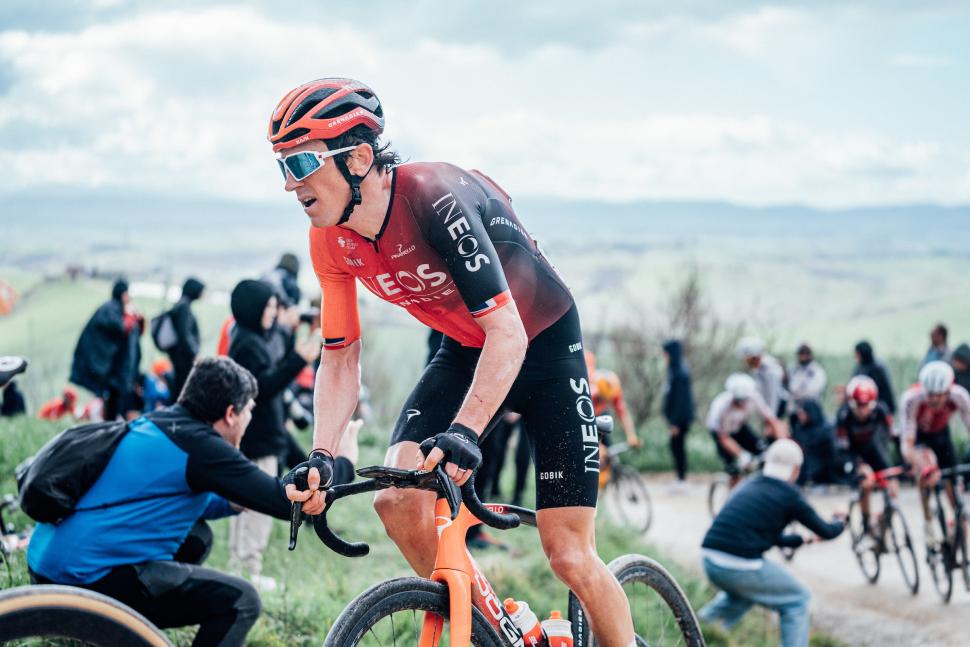 Geraint Thomas Strade Bianche 2024 (Zac Williams/SWpix.com)
Geraint Thomas Strade Bianche 2024 (Zac Williams/SWpix.com)29 April 2024, 08:00
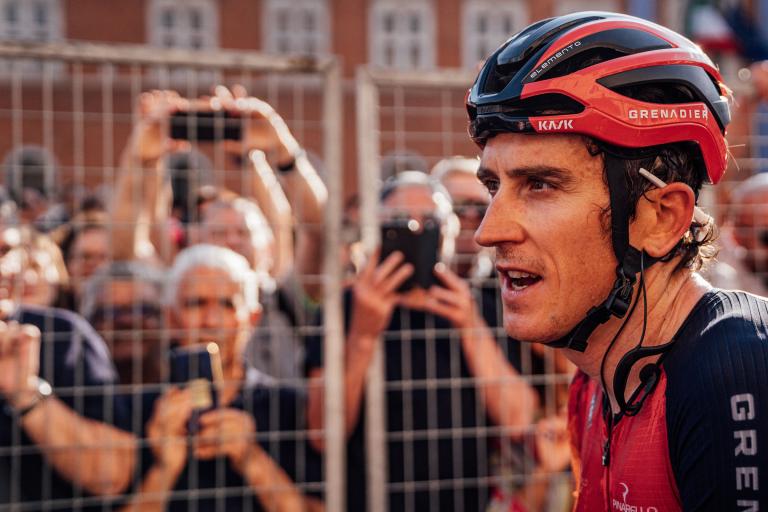
“If this was a new sport, there’s no way it would be allowed”: Geraint Thomas speaks out on rider safety, says 50% of cycling crashes are down to the UCI boss David Lappartient and race organisers
The hilly and cobbled roads of the classics have paved way for the mountainous malaise of the Giro d’Italia, which kicks off in Turin this Saturday with the back-breaking climbs set to return for the Italian Grand Tour (six mountain-top finishes, phew). But with the impossible climbs also come blazingly fast and ominous descents, and with crashes unfortunately stealing so much of the spotlight during the spring cycling season, one could assume the safety of the peloton would be one of the key things on the minds of anyone associated with the sport.
One of those people goes by the name of Geraint Thomas, the lanky and lean cyclist from Cardiff who used to train in the same velodrome that I’ve done a couple of rides myself as well. But you know, he just has a Tour de France, a Paris-Nice and a couple of national championships to show for.
Following the horrific crash on a descent of the Itzulia Basque race, which ended up severely injuring a bunch of riders including Jonas Vingegaard, Primož Roglič, Remco Evenepoel, Steff Cras, and Jay Vine, Thomas believes that safety in pro cycling is not a thing that should be taken lightly anymore.
Speaking to The Guardian, Thomas said: “Everyone’s talking about this now because big-name riders have crashed, but it’s been happening for years. Racing’s got that danger element already, but I feel like it could do so much more to increase safety. There’s road furniture, traffic calming, kerbs sticking out, all that kind of stuff. That adds an element of danger as well. When you’re in it, if I thought about it, I’d be at the back [of the peloton]. You wouldn’t be racing, you couldn’t do it.”
And taking on the burden of an all-seeing prophet, just 48 hours after the interview, there was another crash in the Tour of the Alps where Thomas was adding in the final touches of preparation before he embarks on the ambitious Giro-Tour double at 37 years of age.
Chris Harper and Ben O’Connor hit nasty bumps on the road of a high-speed descent at Trentino, northern Italy, with the former being launched into the air and sliding head-first into a lamp post — coming away with a concussion and superficial wounds.
The crash reeked eerily of the Basque Country crash, where the front of the peloton descending at almost 80km/hr, hit a bump on the road and were thrown into the concrete ditches on the side.
Thomas said: “Ninety per cent of the guys won’t know the roads [in this race],” Thomas says. “You’re going down these descents, flying down them. If this was a new sport, there’s no way it would be allowed.”
He also gave his backing to his team boss, Ineos Grenadiers owner Sir Jim Ratcliffe, who in April issued a public plea for a ramping up of cycling’s safety protocols. “Cyclists are always going to push things to the limit as they are elite sportsmen,” Ratcliffe said, before urging David Lappartient, the president of the UCI, pro cycling’s governing body, to “ensure the safety of the sport”.
Lappartient’s recent comments, claiming that “50 per cent of the crashes are down to riders’ attitudes”, which already drew scrutiny from the cycling world didn’t sit well with Thomas, even if he acknowledges that some riders take risks he wouldn’t.
“I think Lappartient needs to focus more on the 50 per cent he can affect,” Thomas said. “I agree with what he says, but it just doesn’t make sense to me even saying it. That means 50 per cent is still down to him and organisers to do everything they can.”
29 April 2024, 16:32
New British Olympic track bike for Paris 2024 finally unveiled, featuring Hope carbon, Renishaw titanium and Lotus forks
After growing speculation that's been rumbling for almost a year since we first saw the unreleased bike being used in competition, British Cycling has officially unveiled all the details of the new frame British riders will use at the Paris Olympics this summer, called the Hope HBT Paris. Hope and Lotus Engineering were once again on board to develop the frame and fork, while additive manufacturing expert Renishaw was called upon to provide that radical kinked seatpost and a "3D-printed optimised titanium crank".
29 April 2024, 16:05
Planning objections over bike storage idea for WW2 bomb shelters — despite structures already being used as sheds
A neighbour and conservationists have objected to the proposal to turn the "very rare" air raid shelters into bicycle storage, because "the position of the doorways is of particular historic interest" and the shelters are part of the street's "charm"...
29 April 2024, 15:15
29 April 2024, 15:05
“He’d never have dropped me in my prime”: Four-time Paris-Roubaix winner Roger de Vlaeminck says “Pogačar isn’t even half the rider Merckx was”
Big words from Monsieur Paris-Roubaix Roger De Vlaeminck! The four-time winner of Hell of the North, along with three wins at Milan-San Remo, two at Il Lombardia and one each at Flanders and Liège-Bastogne-Liège, there’s no shortage of respect De Vlaeminck has in the world of cycling — he’s more or less a bonafide legend of the sport!
And to make it to the level that he did in the seventies, you’d had to go up against the Cannibal, Eddy Merckx himself. So that’s what De Vlaeminck did, and tales of their rivalry have been told countless times, so I’m not going to bore you with that. So this bit of criticism for arguably the greatest rider of his generation coming from him, well, it’s packed with some sting.
The 76-year-old former Belgian professional cyclist said, in an interview with Wieler Revue, that he believes that if they would be racing together, he wouldn’t be dropped by Pogačar.
Since Pogačar’s two Tour de France and his sustained success in the classics season, with six Monuments to his name by the age of just 25, along with his penchant to always entertain like no one else, has already cemented his status as one of the greats, and even prompted comparisons with Eddy Merckx — not only by Cyrille Guimard, former pro cyclist and legendary coach, who served as the DS for LeMond, Van Impe, Fignon and Hinault, but also by Merckx himself, labelling Pogačar as “the new Merckx”!
> Tadej Pogačar – can he emulate Eddy Merckx and win it all?
But De Vlaeminck disagrees, quite strongly in fact! “Eddy Merckx was on another level, huh?,” he said. “There’s absolutely no comparison between Pogacar and Merckx. Pogacar is a fantastic rider, and the Strade Bianche is a tough race, but not a legendary one, huh. He broke away ninety kilometers [81km] from the finish, and nobody could follow. I guarantee you: if I had been on his wheel, he would never have dropped me in my prime. Never in his life! Just like Francesco Moser and Beppe Saronni couldn’t either.”
“Pogacar is heading to the Giro now, but in Italy, there aren’t any top riders at the moment. You have Filippo Ganna who is decent in time trials, but he’s not an absolute top rider. Can someone explain to me why there aren’t more great riders in Italy?" he continued.
The UAE Team Emirates rider is a hot favourite for the upcoming Corsa Rosa, where he will make his debut and hopes to add a pink jersey to his still relatively young career.
But despite his gilded palmares, De Vlaeminck did not munch his words: “Pogacar is a top rider and by far the best in the world, with Mathieu van der Poel a close second. Unfortunately, Mathieu can't keep up in the mountains. That would have been an exciting duel. But Pogacar isn't even half the rider Merckx was.”
“If Merckx were to race in the same Giro as Pogacar, Pogačar would be five minutes behind in the general classification.”
As I said, big words! Do you agree with De Vlaeminck, or do you think Pogačar could go toe-to-toe with cycling’s greatest? Let us know in the comments!
29 April 2024, 14:11
Thanks for your service, cycle rack 🫡
Range Rover coming a cropper in London W1 due to brave cycle stand, helped by lamppost which fell defending the footway. @WorldBollard pic.twitter.com/mbTiDkiPHC
— Streets for people (@BrendaPuech) April 27, 2024
29 April 2024, 13:16
Near Miss of the Day 903: Driver's punishment pass while blaring horn at two-abreast cyclists earns £300 fine and six penalty points
"We were cycling along a rural road, wide and quiet when the incident happened... excessive use of horn, crossing a solid white line and a close pass to finish..."...
29 April 2024, 12:16
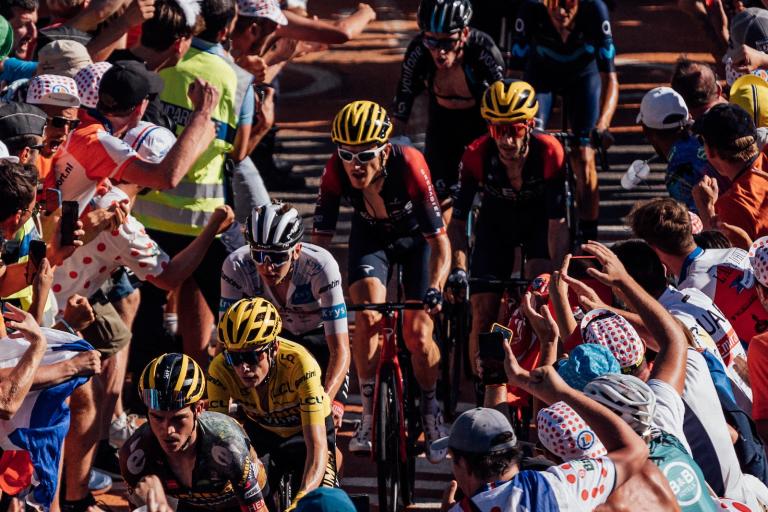
Poll: Can Geraint Thomas outshine Tadej Pogačar at the Giro d’Italia?
The 37-year-old Geraint Thomas will be riding both the Giro d’Italia and Tour de France for the first time in his career — in what’s going to be a first for arguably the best male cyclist right now Tadej Pogačar as well.
And if there were any doubts going into the summer about who’s the favourite to win everything, the 25-year-old explosive two-time Tour winner has quelled them all with the bonkers 81km solo victory at Strade Bianche, the honestly scary performances at Volta a Catalunya, winning four stages out of seven, and most recently, with the dominating win at Liège–Bastogne–Liège.
But Thomas is unfazed, mostly. He said: “Pogacar is the massive favourite, but stranger things have happened. It’s three weeks – it’s different to any other race. Anyone can have a bad day.”
Does he think he’s got it to beat Pogačar? “Possibly, but I’m not one to play mind games. I’ll be doing my thing – try to stay consistent, good and strong all the way through. He’s a racer and he just loves winning. When he retires he’s going to be one of the greatest of all time.”
So what do you guys think? Has G got what it’s going to take to stop the relentless Pogi juggernaut?
29 April 2024, 11:42
Lidl-Trek trying to piss off the entire Italian populace before Giro d'Italia with this *horrifying* Alphebetti Spaghetti image
No but for real, does Lidl-Trek want to get boo'ed at the Giro by all the Italians? And the even bigger question is, how did Jonathan Milan, Andrea Bagioli, and Simone Consonni approve of this?
Brace yourself, and don't blame us for showing this image to you (okay, maybe we do deserve some flak).
We've cooked up something tasty for #GirodItalia 😋🇮🇹 @giroditalia pic.twitter.com/g75UENEfMQ
— Lidl-Trek (@LidlTrek) April 29, 2024
As Jo said in the road.cc group chat, spare a thought for the poor chap who had to open 15 tins to spell Ghebreigzabhier...
29 April 2024, 11:21
First look at Peter Sagan in the Pierre Baguette team jersey!
Nothing to see here other than Peter Sagan prepping for his first and only race in the road cycling calendar, the Tour de Hongrie which starts next week, with in the colours of his new UCI Continental team Pierre Baguette Cycling.
Going for a ride in Žilina. 🇸🇰 pic.twitter.com/Fxfwijc3uC
— Pierre Baguette team (@pierrebagteam) April 29, 2024
29 April 2024, 11:07

Everyone ready for Hacked Lime summer? French DJ remixes Lime bike sounds for a unique electro track
Leave it to the French to make a killer techno dance anthem out of, erm, the Lime bike sounds. Incorporating the click-clack and even the trills of the bell, Povoa, a Parisian electronic artist has produced a song that should please, or displease, based on your disposition towards electronic music, or Lime bikes, for that matter.
On the Bandcamp page, the description reads: “For the lead track ‘Hacked Lime’, Povoa skilfully integrates the distinct clicking sounds produced by Lime bikes, a ubiquitous sound that resonates in major cities worldwide.
“Through the interplay of off-kilter syncopated clicks and meticulously layered sounds, Povoa constructs a captivating groove that leaves audiences yearning for more. This track has been road tested by Chloé Robinson and DJ ADHD across the world, ensuring that it hits on every dance floor this coming summer season.”
Now, that’s one track that I assume Dom Whiting will be all over in the next Drum and Bass On The Bike…
29 April 2024, 10:34
Hopes cycling's "great boost to struggling high street" will not be lost as plan to let cyclists ride pedestrianised key shopping street not approved, goes to consultation instead
A cycling campaign group reasserted its "strong support" for a trial to open up an "ideal place for cycling", lifting a cycle ban on a key shopping street in what could be a "great boost to [a] struggling high street", after the council's transport chief opted to order a consultation on the project rather than approving it.
29 April 2024, 09:45
Your complete guide to buying a second-hand bike — know where to buy, what to look for and avoid getting scammed with these top tips
Bag yourself a bargain, not a dud with these invaluable tips for buying a second hand bike
29 April 2024, 09:05
Cyclists vs Australian police, BMC's topsy-turvy state, and some gorgeous cycling art — here's your weekend roundup
I hope the North London derby and Leverkusen doing Leverkusen things by just refusing to lose a match of football (special mention: Wales scoring a last minute winner against Italy in Women's Six Nations) weren't the only things on your mind this weekend, but if they were and missed out on your cycling news dosage, here's the weekend roundup you've been looking for.
> Near Miss of the Day 902: “I can’t believe I wasn’t hit”
> Charity slams government’s “shocking lack of progress” on active travel
> Travels in cycling hyperreality – Artist draws gorgeous rear cassette piece – in pencil
Adwitiya joined road.cc in 2023 as a news writer after completing his masters in journalism from Cardiff University. His dissertation focused on active travel, which soon threw him into the deep end of covering everything related to the two-wheeled tool, and now cycling is as big a part of his life as guitars and football. He has previously covered local and national politics for Voice Cymru, and also likes to write about science, tech and the environment, if he can find the time. Living right next to the Taff trail in the Welsh capital, you can find him trying to tackle the brutal climbs in the valleys.
Add new comment
16 comments

Rendel Harris
|
9 months ago
0 likes
I don't actually agree with de Vlaeminck's comments, let's wait until the end of a career to see where people are, Pogacar isn't that far off in terms of GTs and Monuments from the point Merckx was at the same age (though not as good), but it's a great excuse to roll out the excellent line of Bobby (or possibly Jack) Charlton's when asked some years ago if the England team of 1966 would beat the present-day lineup: "Oh yes," he said, "I reckon we'd beat them about 3-1." "Only 3-1?" asked the interviewer. "Well," he replied, "You've got to remember we're all over seventy now..."


Smoggysteve
|
9 months ago
1 like
Ref G's comments on crashes, it seems that there are as many if not more crashes than at any time in the sports history. Surely the point of bringing in disc brakes was to improve safety but it's evident that a lot of crashes are down to riders over-estimating their bikes ability to stop. Rim brake or disc brake there is still only a few millimetre of rubber keeping you in the road. Failure to understand the laws of physics means you're heading for an upside down party.
Joe Dombrowski had a characteristically clear and considered take on it in a chat with the cycling podcast last week. He felt there are a number of contributory factors. Philippa York's perspective was quoted at length by GCN in a video, also last week.
People who think there are simple solutions to complex problems are misguided and invariably wrong.




ROOTminus1
|
9 months ago
16 likes

Hirsute
|
9 months ago
4 likes
My £250 hiplock is looking useless if this is anything to go by
https://twitter.com/CrimeLdn/status/1783819874441081234
pipe cutter


This is easier for the thief when only one lock is used to attach the bike, and it doesn't go through the wheel.
If you normally D-lock the rear wheel & seat stays to the stand, and then the front wheel and if possible the downtube to the stand it is going to be difficult to get the pipe cutter in between the bike and the pipe, especially as the stand would need to be cut lower down.

Thats always been the case. Some bike racks are just bolted to the floor and you can just unbolt them. Most of the others you can either do this or use an angle grinder to get through them in a minte or two. Almost certainly if you have a good lock, the lock will take longer to cut than the thing its locked to.
Only thing you can really do is use a couple of good locks and make sure that at least one of them immobilises the bike from being ridden away without it being cut off.
Would be nice if people like this were actually held to account but thats too much to expect. Honestly I wouldn't leave a nice bike anywhere for any amount of time.

Going after the stand rather than the lock itself is nothing new - although I am surprised that he makes such short work of it (previously I've seen stands pre-cut with the cut disguised by tape - I'd assumed that strategy was necessary as the cutting could be done when it's nice and quiet so the thief could take their time).
I would strongly advise where possible to lock the frame and rear wheel to the stand (most U-locks go through both if you get the position right). That way the thief would have to cut the lock before the bike can be ridden. The bike could still be carried away if the stand was cut but having to carry the bike might be enough to convince the thief to go after a different target.
Other benefits include the wheel can't be stolen without cutting the lock (I've seen plenty of sad frames left securely locked but with all components removed), and anything that makes the bike harder to manoeuvre is good (I note in this case the thief was able to move the bike completely out the way to give plenty of space to work, and then easily manoeuvre the bike to get the lock out through the gap made in the stand).


The Sheffield stand design with a cross-bar (can't recall the name) does at least mean that with two locks in the right place it takes twice as long (two sections need cut) - of course that's still "not long".
Sadly it's always a case of "be less appealing to a thief than the next bike" rather than "prevent theft". You can probably avoid a bit of opportunity theft - but if the thief is moderately determined with current cheap tools it's just too easy to get a bike and take it away. There's too little chance of being stopped / caught / meaningfully punished to deter.
Bad experiences mean I will not now lock and leave bikes that look like they cost more than a hundred quid or so outside the house / office for more than a few minutes and certainly not overnight. Anything tempting (new and shiny / electric / otherwise clearly "expensive" - plus a smart thief would probably notice an expensive lock on a camoflaged bike) and security planning comes into play.
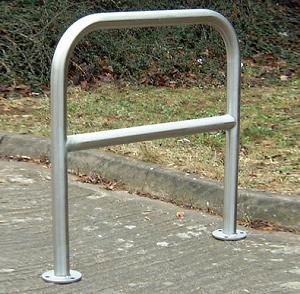

Latest Comments
- chrisonabike 5 min 9 sec ago
Hmm... there is some truth there but I think you have (a) missed something fundamental and (b) have how to start changing things backwards. ...
- DoomeFrog 7 min 16 sec ago
Which could be great news, but if the council are asking for money to repair it now, what happens if they hand it over to a walking/cycling route...
- Steve K 34 min 8 sec ago
Agreed, and I'd contribute....
- BPhillips 42 min 48 sec ago
Thanks for your thoughts David. Argos is looking a good bet.
- mdavidford 53 min 58 sec ago
I'm pretty sure this is at least the third time the BBC have had a story on this - not sure why they keep forgetting that they've covered it.
- cyclisto 1 hour 6 min ago
Watching sports seems super boring to me, so not a problem....
- Secret_squirrel 1 hour 17 min ago
Wattbike are notorious for releasing products before the software is ready. Likely long term it will be fine....
- Secret_squirrel 1 hour 22 min ago
That is a horror show. A gravel racers bike but since it has a motor no racer can use it....
- dubwise 2 hours 39 min ago
Have you seen the prices for vinyl records these days? Music piracy is still alive and kicking.
- bobbinogs 3 hours 48 min ago
I have a way of dealing with tyres that are virtually impossible to fit, I either completely avoid buying them or having made a mistake simply...
